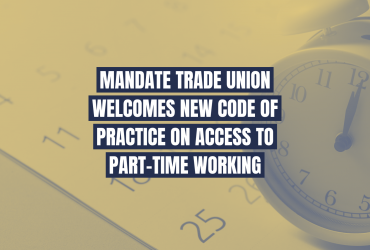Mandate call for stronger penalties for directors of delinquent companies
Friday 19 July 2013Mandate General Secretary and ICTU President John Douglas raised the inadequacies of the Employment Appeals Tribunal at a Joint Oireachtas hearing yesterday and called for stronger sanctions on delinquent companies.
Mr Douglas was critical of management who “hide behind a veil of corporate secrecy to avoid their responsibilities as employers.”
In particular, Mr Douglas raised the plight of the Connolly Shoes workers from Dun Laoghaire who, despite winning an unfair dismissal case back in 2011, have still not received any compensation from their employer.
He explained how directors of limited liability companies sometimes set up associated companies to hide assets when the state deems them liable for breaches in employment law.
Mr Douglas was one of six witnesses at the Joint Oireachtas Committee hearing. The committee also heard from John O’Sullivan, a worker who spent four years chasing his employer for what he was owed through a judgement by the EAT.
IBEC, the employer’s body, also attended the hearing and were widely criticised by the members of the committee for implying that many workers take “frivolous and vexatious” cases against employers for unfair dismissal. IBEC also for called for a cost to be imposed on workers who take cases of unfair dismissal to the EAT.
The hearing was also attended by officials from several government departments who are currently in the process of drafting legislation which will address some of Mandate’s concerns, particularly in relation to the enforcement of awards by the EAT.
Esther Lynch, who also attended the hearing on behalf of the Irish Congress of Trade Unions, said there are 101 ways employers deliberately frustrate the system so that employees drop their case. She also said “the Minister can introduce changes to insolvency rules in Budget 2014 which would address some of the unions’ concerns.”
Deputy Richard Boyd Barrett from the Technical Group raised the injustice of unscrupulous employers, like the Connolly Shoes Directors, who transfer the onus of responsibility for their unfair dismissals onto the public taxpayer by forcing workers to seek their award from the government’s insolvency fund.
Senator David Cullinane from Sinn Fein said he had had personal experience of getting the ‘run around’ from employers back in the early 1990’s and nothing seems to have changed. He added that it wasn’t true to say that the EAT system is free for all workers because there’s a cost in terms of time off work, a cost for union representatives and other associated costs.”
Senator Susan O’Keefe from the Labour Party condemned IBEC’s statements saying that it was disingenuous to say that employees had no costs when taking a case to the EAT. She said this was a “risible thing to say.”
Senator O’Keefe continued by saying she was “disappointed IBEC used the language of vexatious and frivolous.”
John Douglas concluded by saying bad employers should not be rewarded by allowing the taxpayer to bail them out when they make bad decisions.
“Why should bad behaviour from that employer be rewarded? Why should the state not put a charge on the directors of that company . Why shouldn’t those directors be banned from ever being a director again?
“This is about workers. Workers should have access to address their concerns and to right wrongs. The legislation as it stands forces workers down cul de sac’s and it needs to be opened so that workers can access justice,” he said.






